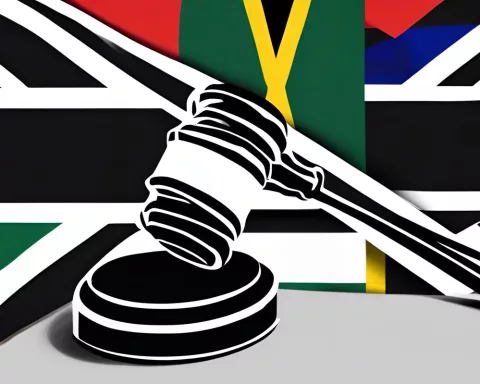Cape Town successfully defended its businesses and infrastructure against the shutdown threats of the National Coloured Congress (NCC). The city’s prompt response, collaboration, and legal actions stopped the NCC’s plans before they could cause lasting damage. The government’s commitment to a law-abiding society and the safety and well-being of its citizens was reaffirmed, and the city’s strength in cooperation and unity against intimidation and chaos was demonstrated.
Defending Businesses and Infrastructure Against Disruption
In a resolute action, the City of Cape Town successfully prevented an impending shutdown of businesses and the disturbance of construction sites in Mitchells Plain. This menace, masterminded by a political organization known as the National Coloured Congress (NCC), employed strategies of intimidation and violence, to which Mayor Geordin Hill-Lewis drew parallels with the tactics utilized by the Economic Freedom Fighters (EFF).
Hill-Lewis maintains that such methods not only endanger the significant businesses that employ numerous people in Mitchells Plain, but they also serve to erode the tranquility and stability that the residents of Cape Town value. By denouncing these tactics, the city showcases its dedication to upholding the law and its unwillingness to tolerate threats to businesses and services.
It is important to highlight that the NCC’s threats were not confined to private enterprises; they also aimed at a City construction site where new cables were being laid to improve the electrical grid. This audacious act emphasizes the group’s readiness to interfere with even crucial infrastructure to achieve its objectives.
Swift Response and Legal Action Against Threats
Cape Town’s prompt reaction to the NCC’s threats deserves recognition, as it delivers a distinct message that intimidation and violence are unwelcome in a cultured society. By pursuing legal action through the High Court, Cape Town authorities halted the NCC’s plans before they could inflict lasting damage.
This forward-thinking strategy was further exhibited by Western Cape Minister of Police Oversight and Community Safety, Reagen Allen. He convened with District Executive Mayors, high-ranking officials from numerous provincial departments, district municipalities, and the South African Police Service (SAPS) to assess provincial preparedness for the shutdown protest planned for October 2nd.
Allen insisted that lawlessness would not be accepted. He reminded the public that although South Africa’s Constitution guarantees the right to protest, it does not allow the violation of others’ rights through violence, intimidation, or property damage. He also reassured citizens that any efforts to provoke disorder would be met with the full force of the law.
Government Commitment and Collaboration for Safety
The Western Cape Government’s dedication to a law-abiding society, fostering a secure environment for its citizens, and guaranteeing equal opportunities for everyone was reaffirmed by Allen. He discussed the relentless endeavors being undertaken to ensure road safety, secure communities, and safe environments for residents.
Furthermore, Allen emphasized the importance of closely collaborating with SAPS and law enforcement agencies, holding them responsible for ensuring that businesses can operate and people can carry out their daily tasks without obstruction. He underscored that nothing is more crucial to human dignity than a steady job and the ability to support one’s family.
Consequently, the potential disturbance planned by the NCC only served to spotlight Cape Town’s resolve to stand united against elements aiming to create havoc and violence. The city’s officials and law enforcement agencies have showcased their dedication to preserving the rule of law and safeguarding citizens’ rights.
The Power of Cooperation and a United City
Moreover, the response to the NCC’s threats exemplifies the strength of cooperation and collaboration among various stakeholders, ranging from provincial departments to district municipalities, all working collectively to ensure the safety and well-being of Cape Town’s residents.
In conclusion, Cape Town’s capability to deter the NCC’s shutdown threats serves as an endorsement of the city’s resilience and determination to maintain the rule of law. As a city united against intimidation and chaos, Cape Town demonstrates its unwavering commitment to the safety, security, and prosperity of its residents.
What was the National Coloured Congress (NCC) planning to do in Cape Town?
The NCC was planning to shut down businesses and disturb construction sites in Mitchells Plain through tactics of intimidation and violence.
How did Cape Town respond to the NCC’s threats?
Cape Town responded swiftly to the NCC’s threats by pursuing legal action through the High Court, halting their plans before they could inflict lasting damage. The city also collaborated with various stakeholders, including law enforcement agencies, to ensure the safety and well-being of its residents.
Who is Mayor Geordin Hill-Lewis?
Mayor Geordin Hill-Lewis is the mayor of the City of Cape Town, and he drew parallels between the tactics used by the NCC and those employed by the Economic Freedom Fighters (EFF).
What is the Western Cape Government’s commitment to its citizens?
The Western Cape Government is committed to fostering a law-abiding society, creating a secure environment for its citizens, and guaranteeing equal opportunities for everyone.
What did Western Cape Minister of Police Oversight and Community Safety, Reagen Allen, say about the shutdown protests?
Reagen Allen reminded the public that while South Africa’s Constitution guarantees the right to protest, it does not allow the violation of others’ rights through violence, intimidation, or property damage. He also reassured citizens that any efforts to provoke disorder would be met with the full force of the law.
What was the NCC’s objective in disrupting businesses and infrastructure in Cape Town?
The NCC’s objective was not just to disrupt private enterprises but also to interfere with crucial infrastructure, such as a City construction site where new cables were being laid to improve the electrical grid.
What does Cape Town’s response to the NCC’s threats demonstrate?
Cape Town’s response to the NCC’s threats demonstrates the city’s resilience and determination to maintain the rule of law. It showcases its commitment to upholding the law and its unwillingness to tolerate threats to businesses and services.
What is the importance of cooperation and collaboration among various stakeholders in Cape Town’s response to the NCC’s threats?
Cape Town’s response to the NCC’s threats exemplifies the strength of cooperation and collaboration among various stakeholders, ranging from provincial departments to district municipalities, all working collectively to ensure the safety and well-being of its residents.












